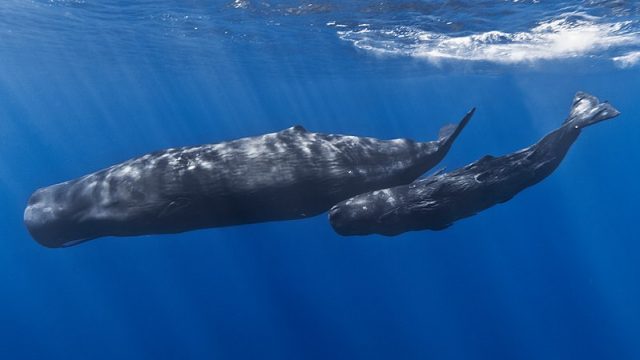Can humans talk with Whales? Research Project Aiming to do just that

In a joint five-year interdisciplinary research study with MIT, Harvard, UC Berkeley, Israel’s Haifa University, and other prestigious institutions, marine scientists hope to decipher how sperm whales speak with each other and if the speech patterns can be replicated so humans can communicate with them.
The researchers naming the project the Cetacean Translation Initiative at a press conference held this week in Dominica, the Caribbean island where the project will take place (CETI).
“These primates make a clicking sound at varying frequencies when they are in the company of other whales. The question is, is this just a simple code or a true language? Right now, our database is not comprehensive enough to know the answer to this question. However, with the advancement of machine learning, and advanced linguistics, we realized that if we gathered enough data about their voices, the context in which these sounds are employed and understood and their behavior and motivation behind these sounds, we can then develop an algorithm which will determine whether they have an authentic language,” said one of the leaders of the project, Prof. Dan Tchernov of University of Haifa’s Leon H. Charney School of Marine Sciences and Scientific Director of The Morris Kahn Marine Research Station.
“Of course, the dream would be if we are able to communicate with them, on their terms” he added.
The potential implications should this project prove successful are numerous since the biodiversity of the planet is quickly dwindling. As such, it is urgent for humans to find a way to coexist with the creatures that remain on earth.
“The sperm whale is the animal with the largest brain, and like humans, it has a complex communication system and lives in tightly knit family groups. These whales also help keep carbon out of the atmosphere, support our oxygen supply, and increase marine life. We now have the tools to identify and translate the deep structure of their communicative patterns and to kickstart the path towards meaningful dialogue with another species. By illustrating whales’ incredible intelligence and advocating for legislation, we can accelerate conservation efforts,” Project CETI’s official website explains.
Leading the project is Prof. David Gruber, Presidential Professor of Biology and Environmental Science at City University of New York, along with Dr. Shane Gero, a National Geographic explorer and an expert in whale biology who has investigated Dominica sperm whales for over a decade, who will work with Prof. Tchernov, serving as the project’s operational director. Other researchers involved include University of University of California, Berkeley and MIT Prof. Shafi Goldwasser, and Harvard University’s Robotic Program Director, Prof. Rob Wood.
Read more about: Whales



